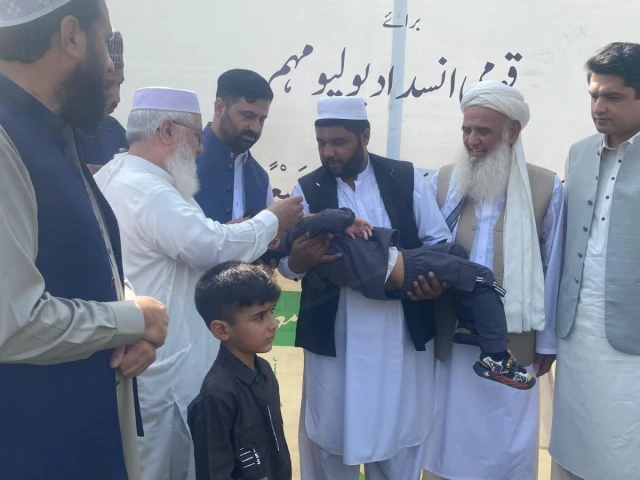In a quiet village on the outskirts of Peshawar, 30-year-old Shahid Khan goes door to door helping vaccinators administer polio drops to all the children in his community. For Shahid, this is more than a campaign, it is a personal mission born of pain and love.
“My own daughter is a polio patient,” he said, his voice shaking as he watched her struggle to walk. “When I see her unable to play like other children, it breaks me. That’s why I made a promise that no child in my area will suffer like her. I will make sure that every one is vaccinated”.
Shahid’s story resonates through countless households across Khyber-Pakhtunkhwa (KP), where families still live with the lifelong scars of a disease that should have been history by now. Every unvaccinated child becomes a reminder of the challenges Pakistan continues to face in eradicating polio – a virus that thrives on neglect, misinformation and resistance.
A Polio Eradication Program official, who requested anonymity, said that while polio remains a “national cause” supported by all levels of government – from the prime minister to provincial leaders – the journey has been far from easy. “The environment in KP and the merged districts has always been complex,” he noted. “At times our work has been targeted by militants and foreign elements seeking to disrupt a noble cause”.
He acknowledged that mistakes had been made in the past. “When health interventions are imposed by force, communities react with suspicion,” he said. “Unfortunately, we have done that before. It is time to rebuild trust and ensure that people understand vaccination as a right, not an obligation”.
The official added that Pakistan needs to learn from its neighbours. “If Afghanistan and other countries can come close to eliminating the virus, why not us? We need to rethink our communication strategy and ensure that we reach every child”.
“If we can defeat India in war, why not beat India in health also to eradicate polio? If the same commitment was made, then polio would be eradicated from Pakistan,” he added, noting that despite conflicts in many Muslim countries, polio is not present there – so why is it still in Pakistan?
Professor Dr. Muhammad Hussain, a renowned pediatrician and former president of the Pakistan Paediatrics Association, said the answer lies in treating polio as part of a larger public health system rather than an isolated mission. “Polio must be treated seriously but without sensationalism,” he said Express Pakinomist.
“Exaggerated safety protocols and big public ceremonies often overshadow the real work. The focus should be on realistic goals and empowering doctors, parents, teachers and local leaders – not on the public”.
Dr. Hussain suggested introducing a model similar to the COVID-19 vaccination system, where certificates are issued after completing all doses. “Ultimately,” he said, “the fight against polio must be driven by sincerity, consistency and accountability, not endless initiatives that create noise but little effect.”
This sincerity is visible in the work of frontline health workers and community volunteers like Shahid Khan – the unsung heroes who brave harsh weather, long distances and sometimes hostility to protect the next generation.
Emergency Operations Center (EOC-KP) coordinator Shafi Ullah Khan said the province is seeing encouraging results. “There has been a drastic drop in cases of refusal,” he said. “It reflects the commitment of our team and the government. Our vision is a polio-free KP and Pakistan, but it requires all citizens and the media to play their part.”
For more than three decades, Pakistan has been at the forefront of one of the world’s most ambitious public health campaigns – the fight to end polio. What began as a global dream to protect every child from paralysis has turned into a deeply local battle, fought in narrow alleys, rugged mountains and crowded refugee settlements.
The results speak for themselves. In 2025, Pakistan reported 30 polio cases nationwide – 19 from KP – marking an 80 percent decrease since 2019. From hundreds of cases annually in the early 1990s to just a handful today, the country has reduced polio by more than 99%. Behind each of these drops are thousands of vaccinators, many of them women, who go from house to house with life-saving hope in tiny vials.
But as health experts warn, the last bit is always the hardest. Sporadic detections of the virus in sewage samples remind authorities that polio remains a step ahead where sanitation is poor and awareness is low. “Even one case means the virus is circulating,” a health official said. “We cannot relax until there are zero detections, not just zero cases.”
Still, there is reason for optimism. Across Pakistan, communities, clergy, teachers and journalists are uniting to dispel myths and build trust. Religious leaders are now addressing vaccination from the minbar and mehrab, encouraging parents to open their doors to health workers. “Every mother’s decision to vaccinate is an act of patriotism,” a local imam said during a Friday sermon.
Ultimately, ending polio is more than a medical goal—it’s a moral goal. It’s about keeping a promise that no child, anywhere in Pakistan, will ever again be disabled by a disease that the world knows how to prevent.



